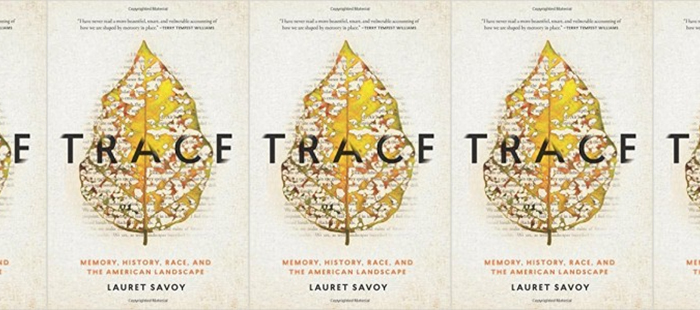Review: TRACE: MEMORY, HISTORY, RACE, & THE AMERICAN LANDSCAPE by Lauret Edith Savoy

Trace: Memory, History, Race, and the American Landscape
Lauret Edith Savoy
Counterpoint, Nov 2015
240 pp; $25
Reviewed by Marie Sweetman
Reading nature writing is second in transformative joy only to being in nature. That joy is slippery in Trace: Memory, History, Race, and the American Landscape by Lauret Edith Savoy, where moments of sublimity are often punctuated by cruelty and alienation. Take this startlingly alive sentence:
“When I was a horse, a wild Appaloosa full of speed, I’d run up and down sidewalks, around playgrounds and our yard—just to feel wind rush with me.”
Yes! Feel that flash of elation, how it blurs the human and the wild. But in the next paragraph, Savoy recalls a classmate who spat on her and called her hateful racial slurs when she was only eight years old. Her experience of nature becomes part antidote to, part escape from a society that made her feel inferior. “I ran not just to feel wind,” she writes, “but in hope it would blow away whatever it was about me that was bad and hate-deserving.”
Trace is many-faceted: eight densely-researched essays that take us from California to Point Sublime in the Grand Canyon, a plantation in South Carolina, a segregated army base in Arizona, and through the tangled political and racial realities of past and present Washington, D.C. Trace is also Savoy’s personal journey, of self and ancestors and family. She traces her Native, African, and European-American roots across the nation, often impeded by history’s glossy revision or outright silence about the peoples of color who built America. She finds evidence of untold histories in unmarked gravestones and between the lines of white men’s centuries-old ledgers. “Silence,” she writes, “can be a sanctuary or frame for stories told. Silence also obscures origins.”
Savoy is most preoccupied by history’s power to obscure peoples and critical events. In Trace, she undoes this harmful silence. The very existence of Trace is a reckoning of the whitewashed nature writing that came before it. Savoy confronts her fear of exclusion when she first realized, as a teenager, that Aldo Leopold’s “only reference to slavery, to human beings as property, was about ancient Greece….” The question she then asks of this important early influence sets the investigative tone for the rest of the book: “Did Aldo Leopold consider me?”
Reflecting often on her parents’ reserve when it came to their own histories and contexts, she clings to the information that has trickled down to her: a photograph of her mother in her second lieutenant’s uniform as a nurse during World War II; a copy of Alien Land, a science fiction novel by her father that she links indelibly to Leopold’s Land Ethic; an aunt who firmly tells her “the Savoys were never slaves.” Each of these artifacts allows her to piece together or “re-member” her history. Later, with the help of a genealogically-minded cousin, she uncovers further truths, which bring their own heavy silence.
Beyond joy, Trace offers, finally, intense inquiry, unanswered questions, and a difficult but beautiful and more whole understanding of America’s storied landscape.
Marie Sweetman is an editor and writer in Boston, MA. Find her on Twitter @dubitablymarie.

